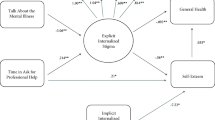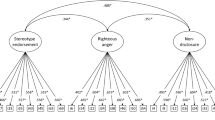Abstract
Meritocratic worldviews that stress personal responsibility, such as the Protestant ethic or general beliefs in a just world, are typically associated with stigmatizing attitudes and could explain the persistence of mental illness stigma. Beliefs in a just world for oneself (“I get what I deserve”), however, are often related to personal well-being and can be a coping resource for stigmatized individuals. Despite these findings in other stigmatized groups, the link between worldviews and the stigma of psychiatric disorders is unknown. We measured just world beliefs for self and others as well as endorsement of the Protestant ethic in 85 people with schizophrenia, schizoaffective or affective disorders and 50 members of the general public. Stigmatizing attitudes toward people with mental illness (perceived responsibility, perceived dangerousness, general agreement with negative stereotypes) were assessed by self-report. Using a response-latency task, the Brief Implicit Association Test, we also examined guilt-related implicit negative stereotypes about mental illness. We found a consistent positive link between endorsing the Protestant ethic and stigmatizing self-reported attitudes in both groups. Implicit guilt-related stereotypes were positively associated with the Protestant ethic only among members of the public. Among people with mental illness, stronger just world beliefs for self were related to reduced self-stigma, but also to more implicit blame of persons with mental illness. The Protestant ethic may increase (self-)stigmatizing attitudes; just world beliefs for oneself, on the other hand, may lead to unexpected implicit self-blame in stigmatized individuals. Public anti-stigma campaigns and initiatives to reduce self-stigma among people with mental illness should take worldviews into account.
Similar content being viewed by others
References
Alonso J, Buron A, Rojas-Farreras S, de Graaf R, Haro JM, de Girolamo G, Bruffaerts R, Kovess V, Matschinger H, Vilagut G (2009) Perceived stigma among individuals with common mental disorders. J Affect Disord 118:180–186
Angermeyer MC, Dietrich S (2006) Public beliefs about and attitudes towards people with mental illness: a review of population studies. Acta Psychiatr Scand 113:163–179
Bègue L (2005) Self-esteem regulation in threatening social comparison: the roles of belief in a just world and self-efficacy. Soc Behav Pers 33:69–76
Bègue L, Bastounis M (2003) Two spheres of belief in justice: extensive support for the bidimensional model of belief in a just world. J Pers 71:435–463
Clay S, Schell B, Corrigan PW, Ralph RO (2005) On our own, together: peer programs for people with mental illness. Vanderbilt University Press, Nashville
Corrigan PW (2005) On the stigma of mental illness: practical strategies for research and social change. American Psychological Association, Washington, DC
Corrigan PW, Markowitz FE, Watson A, Rowan D, Kubiak MA (2003) An attribution model of public discrimination towards persons with mental illness. J Health Soc Behav 44:162–179
Corrigan PW, Morris S, Larson JE, Rafacz J, Wassel A, Michaels P, Wilkniss S, Batia K, Rüsch N (2010) Self-stigma and coming out about one’s mental illness. J Community Psychol 38:1–17
Corrigan PW, Watson AC, Barr L (2006) The self-stigma of mental illness: implications for self-esteem and self-efficacy. J Soc Clin Psychol 25:875–884
Crandall CS, Cohen C (1994) The personality of the stigmatizer: cultural world view, conventionalism, and self-esteem. J Res Pers 28:461–480
Dzuka J, Dalbert C (2002) Mental health and personality of Slovak unemployed adolescents: the impact of belief in a just world. J Appl Soc Psychol 32:732–757
Gaebel W, Möller H-J, Rössler W (2004) Stigma - Diskriminierung - Bewältigung. Der Umgang mit sozialer Ausgrenzung psychisch Kranker. Kohlhammer, Stuttgart
Gawronski B, Bodenhausen GV (2006) Associative and propositional processes in evaluation: an integrative review of implicit and explicit attitude change. Psychol Bull 132:692–731
Glover RJ (1994) Using moral and epistemological reasoning as predictors of prejudice. J Soc Psychol 134:633–640
Greenwald AG, McGhee DE, Schwartz JL (1998) Measuring individual differences in implicit cognition: the Implicit Association Test. J Pers Soc Psychol 74:1464–1480
Greenwald AG, Nosek BA, Banaji MR (2003) Understanding and using the Implicit Association Test: I. An improved scoring algorithm. J Pers Soc Psychol 85:197–216
Greenwald AG, Poehlman TA, Uhlmann E, Banaji MR (2009) Understanding and using the Implicit Association Test: III. Meta-analysis of predictive validity. J Pers Soc Psychol 97:17–41
Hafer CL, Bègue L (2005) Experimental research on just-world theory: problems, developments, and future challenges. Psychol Bull 131:128–167
Henderson C, Thornicroft G (2009) Stigma and discrimination in mental illness: time to change. Lancet 373:1930–1932
Hinshaw SP (2007) The mark of shame: stigma of mental illness and an agenda for change. Oxford University Press, Oxford
Hong YY, Morris MW, Chiu CY, Benet-Martínez V (2000) Multicultural minds: a dynamic constructivist approach to culture and cognition. Am Psychol 55:709–720
Jost JT, Banaji MR, Nosek BA (2004) A decade of system justification theory: accumulated evidence of conscious and unconscious bolstering of the status quo. Political Psychol 25:881–919
Katz I, Hass RG (1988) Racial ambivalence and American value conflict: correlational and priming studies of dual cognitive structures. J Pers Soc Psychol 55:893–905
Knight MTD, Wykes T, Hayward P (2006) Group treatment of perceived stigma and self-esteem in schizophrenia: a waiting list trial of efficacy. Behav Cogn Psychother 34:305–318
Lerner MJ (1980) The belief in a just world: a fundamental delusion. Plenum, New York
Lincoln TM, Arens E, Berger C, Rief W (2008) Can antistigma campaigns be improved? A test of the impact of biogenetic versus psychosocial causal explanations on implicit and explicit attitudes to schizophrenia. Schizophr Bull 34:984–994
Link BG, Struening EL, Neese-Todd S, Asmussen S, Phelan JC (2002) On describing and seeking to change the experience of stigma. Psychiatr Rehabil Skills 6:201–231
Link BG, Yang LH, Phelan JC, Collins PY (2004) Measuring mental illness stigma. Schizophr Bull 30:511–541
Lipkus IM, Dalbert C, Siegler IC (1996) The importance of distinguishing the belief in a just world for self versus for others: implications for psychological well-being. Pers Soc Psychol Bull 22:666–677
Lysaker PH, Buck KD, Roe D (2007) Psychotherapy and recovery in schizophrenia: a proposal of key elements for an integrative psychotherapy attuned to narrative in schizophrenia. Psychol Serv 4:28–37
Major B, Kaiser CR, O’Brien LT, McCoy SK (2007) Perceived discrimination as worldview threat or worldview confirmation: implications for self-esteem. J Pers Soc Psychol 92:1068–1086
Murray JD, Spadafore JA, McIntosh WD (2005) Belief in a just world and social perception: evidence for automatic activation. J Soc Psychol 145:35–47
Norman RM, Sorrentino R, Windell D, Manchanda R (2008) Are personal values of importance in the stigmatization of people with mental illness? Can J Psychiatry 53:848–856
Ottati V, Bodenhausen GV, Newman LS (2005) Social psychological models of mental illness stigma. In: Corrigan PW (ed) On the stigma of mental illness: practical strategies for research and social change. American Psychological Association, Washington, DC, pp 99–128
Otto K, Boos A, Dalbert C, Schöps D, Hoyer J (2006) Posttraumatic symptoms, depression, and anxiety of flood victims: the impact of the belief in a just world. Pers Individ Dif 40:1075–1084
Perlick DA, Miklowitz DJ, Link BG, Struening E, Kaczynski R, Gonzalez J, Manning LN, Wolff N, Rosenheck RA (2007) Perceived stigma and depression among caregivers of patients with bipolar disorder. Br J Psychiatry 190:535–536
Phelan JC, Bromet EJ, Link BG (1998) Psychiatric illness and family stigma. Schizophr Bull 24:115–126
Quinn DM, Crocker J (1999) When ideology hurts: effects of belief in the Protestant ethic and feeling overweight on the psychological well-being of women. J Pers Soc Psychol 77:402–414
Roe D, Hasson-Ohayon I, Kravetz S, Yanos PT, Lysaker PH (2008) Call it a monster for lack of anything else: narrative insight in psychosis. J Nerv Ment Dis 196:859–865
Rüsch N, Angermeyer MC, Corrigan PW (2005) Mental illness stigma: concepts, consequences, and initiatives to reduce stigma. Eur Psychiatry 20:529–539
Rüsch N, Corrigan PW, Powell K, Rajah A, Olschewski M, Wilkniss S, Batia K (2009) A stress-coping model of mental illness stigma: II. Emotional stress responses, coping behavior and outcome. Schizophr Res 110:65–71
Rüsch N, Corrigan PW, Todd AR, Bodenhausen GV (2010) Implicit self-stigma in people with mental illness. J Nerv Ment Dis 198:150–153
Rüsch N, Corrigan PW, Wassel A, Michaels P, Larson JE, Olschewski M, Wilkniss S, Batia K (2009) Self-stigma, group identification, perceived legitimacy of discrimination and mental health service use. Brit J Psychiatry 195:551–552
Rüsch N, Corrigan PW, Wassel A, Michaels P, Olschewski M, Wilkniss S, Batia K (2009) A stress-coping model of mental illness stigma: I. Predictors of cognitive stress appraisal. Schizophr Res 110:59–64
Rüsch N, Corrigan PW, Wassel A, Michaels P, Olschewski M, Wilkniss S, Batia K (2009) Ingroup perception and responses to stigma among persons with mental illness. Acta Psychiatr Scand 120:320–328
Rüsch N, Hölzer A, Hermann C, Schramm E, Jacob GA, Bohus M, Lieb K, Corrigan PW (2006) Self-stigma in women with borderline personality disorder and women with social phobia. J Nerv Ment Dis 194:766–773
Rüsch N, Todd AR, Bodenhausen GV, Corrigan PW (2010) Biogenetic models of psychopathology, implicit guilt, and mental illness stigma. Psychiatry Res. doi:10.1016/j.psychres.2009.09.010
Rüsch N, Todd AR, Bodenhausen GV, Olschewski M, Corrigan PW (2010) Automatically activated shame reactions and perceived legitimacy of discrimination: a longitudinal study among people with mental illness. J Behav Ther Exp Psychiatry 41:60–63
Rüsch N, Todd AR, Bodenhausen GV, Weiden PJ, Corrigan PW (2009) Implicit versus explicit attitudes toward psychiatric medication: implications for insight and treatment adherence. Schizophr Res 112:119–122
Saraceno B, Dua T (2009) Global mental health: the role of psychiatry. Eur Arch Psychiatry Clin Neurosci 259(Supplement 2):109–117
Schomerus G, Matschinger H, Angermeyer MC (2009) The stigma of psychiatric treatment and help-seeking intentions for depression. Eur Arch Psychiatry Clin Neurosci 259:298–306
Schulze B, Richter-Werling M, Matschinger H, Angermeyer MC (2003) Crazy? So what! Effects of a school project on students’ attitudes towards people with schizophrenia. Acta Psychiatr Scand 107:142–150
Schulze B, Rössler W (2005) Caregiver burden in mental illness: review of measurement, findings and interventions in 2004–2005. Curr Opin Psychiatry 18:684–691
Sheehan DV, Lecrubier Y, Sheehan KH, Amorim P, Janavs J, Weiller E, Hergueta T, Baker R, Dunbar GC (1998) The mini-international neuropsychiatric interview (M.I.N.I.): the development and validation of a structured diagnostic psychiatric interview for DSM-IV and ICD-10. J Clin Psychiatry 59(Suppl 20):22–33
Sriram N, Greenwald AG (2009) The Brief Implicit Association Test. Exp Psychol 56:283–294
Stier A, Hinshaw SP (2007) Explicit and implicit stigma against individuals with mental illness. Aust Psychol 42:106–117
Sutton RM, Douglas KM (2005) Justice for all, or just for me? More evidence of the importance of the self-other distinction in just-world beliefs. Pers Individ Dif 39:637–645
Teachman BA, Woody SR (2003) Automatic processing in spider phobia: implicit fear associations over the course of treatment. J Abnorm Psychol 112:100–109
Thornicroft G (2006) Shunned: discrimination against people with mental illness. Oxford University Press, Oxford
Thornicroft G, Brohan E, Kassam A, Lewis-Holmes E (2008) Reducing stigma and discrimination: candidate interventions. Int J Ment Health Syst 2:3
Weber M (1920) Die protestantische Ethik und der Geist des Kapitalismus. Gesammelte Aufsätze zur Religionssoziologie. J.C.B. Mohr, Tübingen, pp 1–206
Wilkinson GS, Robertson GJ (2006) Wide Range Achievement Test (WRAT4). Psychological Assessment Resources, Lutz
Yang LH, Kleinman A, Link BG, Phelan JC, Lee S, Good B (2007) Culture and stigma: adding moral experience to stigma theory. Soc Sci Med 64:1524–1535
Acknowledgments
We are grateful to all participants. We thank Karen Batia, Whitney Key, Norine McCarten, Patrick Michaels, Karina Powell, Anita Rajah, Abigail Wassel, Sandra Wilkniss, and staff of Thresholds and Heartland Alliance in Chicago for assistance with recruitment and data collection. We thank N. Sriram and Tony Greenwald for assistance in designing and implementing the BIAT. Our work was supported by a Marie Curie Outgoing International Fellowship of the European Union to Nicolas Rüsch and by funding from NIAAA, NIMH, and the Fogarty International Center to Patrick W. Corrigan.
Author information
Authors and Affiliations
Corresponding author
Rights and permissions
About this article
Cite this article
Rüsch, N., Todd, A.R., Bodenhausen, G.V. et al. Do people with mental illness deserve what they get? Links between meritocratic worldviews and implicit versus explicit stigma. Eur Arch Psychiatry Clin Neurosci 260, 617–625 (2010). https://doi.org/10.1007/s00406-010-0111-4
Received:
Accepted:
Published:
Issue Date:
DOI: https://doi.org/10.1007/s00406-010-0111-4




